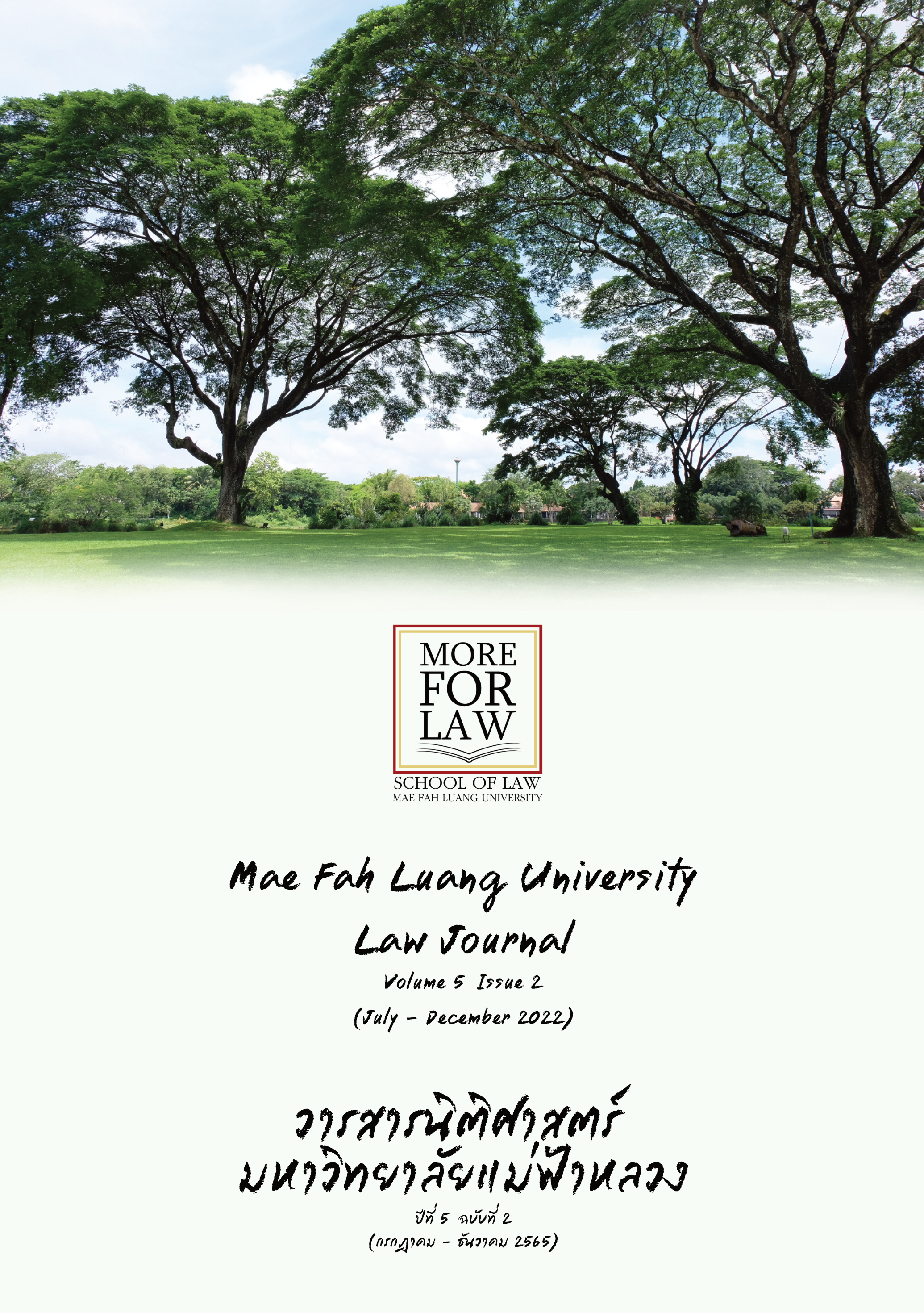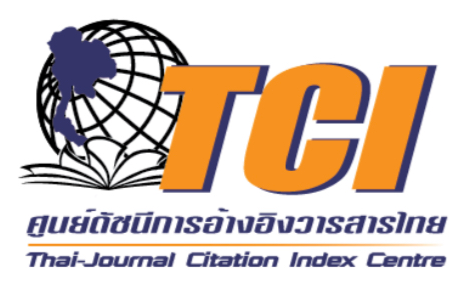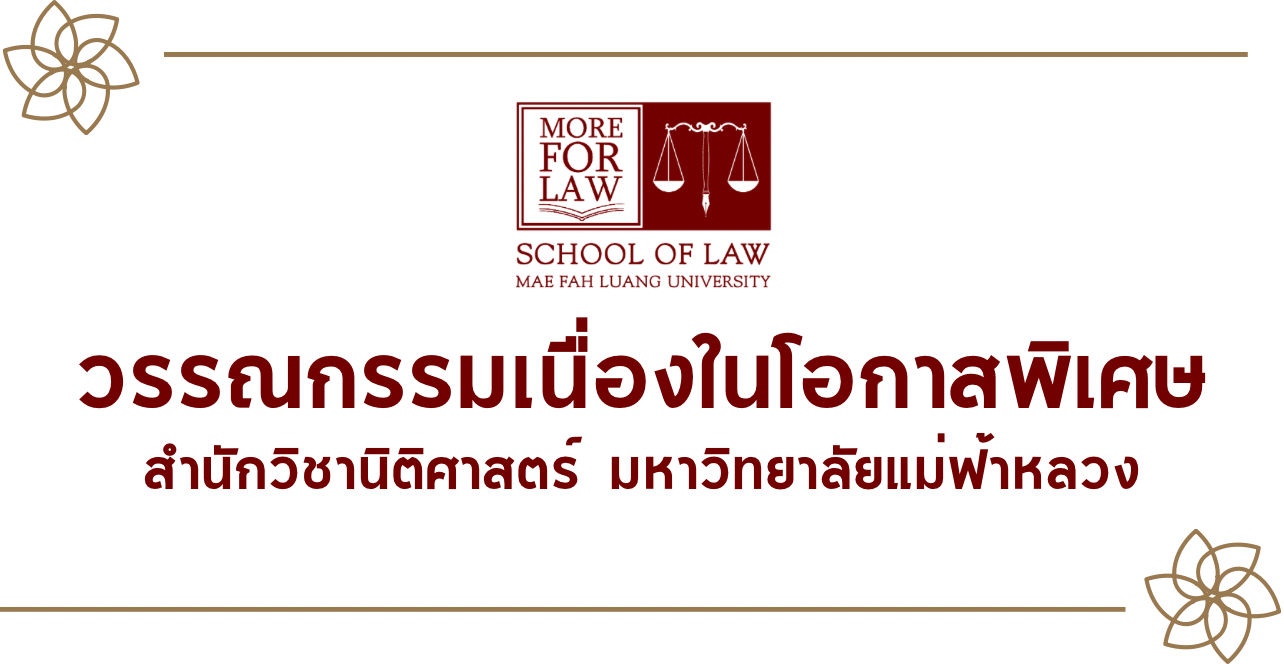แนวทางและมาตรการทางกฎหมายเพื่อการส่งเสริมและกำกับดูแลการเรียนรู้ตลอดชีวิตสำหรับประเทศไทย
DOI:
https://doi.org/10.14456/mfulj.2022.8คำสำคัญ:
ร่างพระราชบัญญัติการส่งเสริมการเรียนรู้ พ.ศ. ...., การเรียนรู้ตลอดชีวิต, การส่งเสริมและกำกับดูแล, องค์การศึกษาวิทยาศาสตร์และวัฒนธรรมแห่งสหประชาชาติบทคัดย่อ
การศึกษาวิจัยนี้มีวัตถุประสงค์ 5 ประการ ได้แก่ 1) เพื่อศึกษาแนวคิดทฤษฎีที่เกี่ยวข้องกับการกำกับดูแล และส่งเสริมการเรียนรู้ตลอดชีวิต 2) เพื่อศึกษาแนวทางระหว่างประเทศในการกำกับดูแล และส่งเสริมการเรียนรู้ตลอดชีวิต 3) เพื่อศึกษามาตรการทางกฎหมายเกี่ยวกับการกำกับดูแล และส่งเสริมการเรียนรู้ตลอดชีวิตของประเทศที่เลือกศึกษา ได้แก่ ประเทศญี่ปุ่น สาธารณรัฐเกาหลี และประเทศฟินแลนด์ 4) เพื่อศึกษาข้อจำกัดของร่างพระราชบัญญัติการส่งเสริมการเรียนรู้ พ.ศ. …. 5) เพื่อวิเคราะห์และเสนอแนะมาตรการทางกฎหมายที่เหมาะสมของประเทศไทยในการกำกับดูแล และส่งเสริมการเรียนรู้ตลอดชีวิต การศึกษาวิจัยนี้ใช้วิธีการศึกษาวิจัยเชิงคุณภาพที่เป็นการวิจัยเอกสารทั้งในและต่างประเทศที่เกี่ยวกับการกำกับดูแล และส่งเสริมการเรียนรู้ตลอดชีวิต โดยมีประเทศที่เลือกศึกษา ได้แก่ ประเทศฟินแลนด์ สาธารณรัฐเกาหลีและประเทศญี่ปุ่น รวมถึงศึกษาเปรียบเทียบข้อจำกัดของร่างพระราชบัญญัติส่งเสริมการเรียนรู้ พ.ศ. …. นอกจากนี้ยังมีการสัมภาษณ์เชิงลึกจากกลุ่มตัวอย่าง 3 กลุ่มจำนวน 10 คน ได้แก่ 1) กลุ่มผู้เชี่ยวชาญด้านการศึกษา และกฎหมาย 2) กลุ่มตัวแทนจากหน่วยงานภาครัฐที่เกี่ยวข้อง 3) กลุ่มประชาชนทั่วไป
ผลการศึกษาวิจัยพบว่า 1) การเรียนรู้ตลอดชีวิตจำเป็นสำหรับบุคคล สังคม และรัฐ และการเรียนรู้ถือเป็นสิทธิมนุษยชนรัฐจึงมีหน้าที่รับรองและกำหนดกฎหมายในการสร้างระบบและโครงสร้างการเรียนรู้ตลอดชีวิตอันถือเป็นพันธกิจของรัฐโดยการมีส่วนร่วมของประชาชน ทั้งนี้ ควรมีการกระจายอำนาจสู่ท้องถิ่นประกอบด้วยเพื่อตอบสนองต่อความต้องการของบุคคลและท้องถิ่น และยังเป็นการเพิ่มการมีส่วนร่วมของประชาชนอีกทางหนึ่ง 2) องค์การศึกษาวิทยาศาสตร์และวัฒนธรรมแห่งสหประชาชาติให้ความสำคัญกับการเรียนรู้ตลอดชีวิตและมีการกำหนดแนวทางให้เกิดการพัฒนาคุณภาพการศึกษา ซึ่งรวมถึงการเรียนรู้ตลอดชีวิตให้ครอบคลุม เท่าเทียม แก่ทุกคน 3) ประเทศญี่ปุ่นเป็นประเทศที่มุ่งเน้นการกระจายอำนาจซึ่งส่งผลให้เกิดการตอบสนองการเรียนรู้ของปัจเจกชนและท้องถิ่นได้อย่างดียิ่งขึ้น ในขณะเดียวกันการมีส่วนร่วมของเอกชนในการขับเคลื่อนเศรษฐกิจและแสวงหาความต้องการของตลาดเพื่อเป็นการกำหนดแนวทางการพัฒนาการเรียนรู้ตลอดชีวิต สำหรับสาธารณรัฐเกาหลีมีหน่วยงานกลางที่รับผิดชอบเฉพาะในการจัดการเรียนรู้ตลอดชีวิตโดยคำนึงถึงการมีส่วนร่วมของประชาชนและมีภาคเอกชนเข้ามามีส่วนร่วมผ่านทางการจัดตั้งสถานศึกษาตลอดชีวิตรวมถึงการมีระบบรับรองคุณวุฒิการศึกษา ในส่วนของประเทศฟินแลนด์รัฐเป็นผู้ดำเนินการหลักผ่านการจัดสรรงบประมาณโดยมีการมีส่วนร่วมในระดับย่อย เช่น โรงเรียน และมีการเผยแพร่ข้อมูลบริการด้านการศึกษาแก่ประชาชนอย่างสม่ำเสมอ 4) ร่างพระราชบัญญัติการส่งเสริมการเรียนรู้ พ.ศ. .... ขาดมาตรการที่จำเป็นในการส่งเสริมและกำกับดูแลการเรียนรู้ตลอดชีวิตของประชาชน 5) ผู้วิจัยมีข้อเสนอแนะให้มีการแก้ไขเพิ่มเติมในประเด็นต่าง ๆ ได้แก่ รูปแบบของการเรียนรู้ การใช้สาธารณสมบัติของแผ่นดินเพื่อส่งเสริมการเรียนรู้ตลอดชีวิต การจัดตั้งตำแหน่งผู้ให้คำปรึกษาด้านการเรียนรู้ตลอดชีวิตประจำตำบล หลักเกณฑ์การมีส่วนร่วมของภาคีเครือข่ายในรูปแบบการมีส่วนร่วมเชิงรุก และมาตรการเชิงนโยบายอื่น ๆ เพื่อนำไปสู่มาตรการในการส่งเสริมและกำกับดูแลการเรียนรู้ตลอดชีวิตที่เหมาะสมและเป็นรูปธรรม
Downloads
เอกสารอ้างอิง
ประเวศ วะสี, อภิวัฒน์การเรียนรู้...สู่จุดเปลี่ยนประเทศไทย, ครั้งที่ 1 (กรุงเทพมหานคร: สำนักงานส่งเสริมสังคมแห่งการเรียนรู้และคุณภาพเยาวชน (สสค.), 2557).
สํานักงานคณะกรรมการการศึกษาขั้นพื้นฐาน, แนวทางการดําเนินงานขององค์คณะบุคคลและการมีส่วนร่วม, (กรุงเทพมหานคร: โรงพิมพ์สหกรณ์การเกษตรแห่งประเทศไทย, 2550).
สหประชาชาติประเทศไทย, การศึกษาที่มีคุณภาพ [ออนไลน์], แหล่งที่มา: https://thailand.un.org/th/sdgs/4
สุวิธิดา จรุงเกียรติกุล, นิทัศน์แนวคิดและแนวทางการส่งเสริมการเรียนรู้ตลอดชีวิตในประเทศไทย, (กรุงเทพมหานคร: สำนักพิมพ์แห่งจุฬาลงกรณ์มหาวิทยาลัย, 2564).
สุวิธิดา จรุงเกียรติกุล, แนวทางการจัดการศึกษาตลอดชีวิตเพื่อขับเคลื่อนชุมชนการเรียนรู้ในบริบทสังคมและวัฒนธรรมของประเทศไทย (Guides for Lifelong Education Management to Mobilize Learning Community in the Social-Cultural Context of Thailand, วารสารครุศาสตร์ จุฬาลงกรณ์มหาวิทยาลัย, ปีที่ 46 ฉบับที่ 2 (มิถุนายน 2561).
อมรรักษ์ สวนชูผล, แนวคิดการเรียนรู้ด้วยการนำตนเองกับการจัดการศึกษา, วารสารบัณฑิตศึกษา มหาวิทยาลัยราชภัฏวไลยอลงกรณ์ ในพระบรมราชูปถัมภ์, ปีที่ 9 ฉบับที่ 1 (เมษายน 2558).
อรทัย ศักดิ์สูง, การวิเคราะห์ความสอดคล้องระหว่างทฤษฎีแอนดราโกจี (Andragogy) ของ มัลคัล โนลส์ กับวิธีการสอนในหลักสูตรผู้บริหารสถานศึกษาระดับสูงของสถาบันพัฒนาผู้บริหารการศึกษา, (วิทยานิพนธ์ปริญญาโท หลักสูตรปริญญาครุศาสตรมหาบัณฑิต คณะครุศาสตร์ จุฬาลงกรณ์มหาวิทยาลัย, 2543).
Carolyn Medel-Anonuevo, Toshio Ohsako and Werner Mauch, Revisiting Lifelong Learning for the 21st Century, (Hamburg: United Nations Educational, Scientific and Cultural Organization, 2001).
Center for Public Impact a BCG Foundation, Japan’s Lifelong Learning Promotion Law [Online], Source: https://www.centreforpublicimpact.org/case-study/lifelong-learning-japan/
D. R. Cruickshank and D. Haefele, Good Teachers, Plural, Educational Leadership, Volume 58 Issue 5 (2001).
European Commission, Finland: Adult Education and Training [Online], Source: https://eacea.ec.europa.eu/national-policies/eurydice/content/adult-education-and-training-25_en
Finland, Ministry of Education and Culture, Liberal Adult Education [Online], Source: https://minedu.fi/en/liberal-adult-education
Hannele Niemi and Ulpukka Isopahkala-Bouret, Lifelong Learning in Finish Society – An Analysis of National Policy Documents, November 2012 [Online], Source: https://www.researchgate.net/publication/277017765_Lifelong_learning_in_Finnish_society_-_An_analysis_of_national_policy_documents
Hilla Auren, Finland Country Case Study [Online], Source: https://unesdoc.unesco.org/ark:/48223/pf0000259545/PDF/259545eng.pdf.multi
In Tak Kwon, Junghwan Kim and Doo Hun Lim, Becoming a Lifelong Learning City: Lessons from a Provincial City in South Korea [Online], Source: https://files.eric.ed.gov/fulltext/ED570514.pdf
J. H. Stronge and J. Hindman, Hiring the Best Teachers, Educational Leadership, Volume 60 Issue 8 (2003).
Japanese Civil Society Organizations (CSOs), Social Education/Adult Education in Japan: Policies, Practices and Movements During the Last 12 Years, May 2009 [Online], Source: http://prof.mt.tama.hosei.ac.jp/~yarai/JDGMCON6/CSOsREPfinalen.pdf
Jari Lavonen, Governance decentralisation in education: Finnish innovation in education, Gobernanza descentralizada: Una innovación finlandesa en educación, Revista de Educación a Distancia, Volume 53 Issue 1 (Marzo 2017).
Jeong Mee-Ryang and Lee Woojin, Korean Education: Educational Thought, System and Content [Online], Source: https://www.aks.ac.kr/ikorea/upload/intl/otmai/UserFiles/UKS9_Korean%20Education_eng.pdf
Jung Eun Lee, Implementation of Lifelong Learning Policies in South Korea: A World Society Perspective 4 [Online], Source: https://newprairiepress.org/cgi/viewcontent.cgi?article=3706&context=aerc
Matti Kyro, Vocational Education and Training in Finland: Short Description [Online], Source: https://www.cedefop.otmai.eu/files/5171_en.pdf
OECD iLibrary, Strengthening the Governance of Skills Systems: Lessons from Six OEDC Countries [Online], Source: https://www.oecd-ilibrary.org/docserver/cd2b486a-en.pdf?expires=1612884274&id=id&accname=guest&checksum=A67E77E7A114FABFE1C3ECB4BE5629
Rina Cohen, Lifelong Learning: Right and Benefit, Duty and Respon-sibility, Adult Education in Israel and Around the World: Achievement and Outlining a Policy [Online], Source: https://cms.education.gov.il/NR/rdonlyres/513BEF32-75A1-4D95-9586-6D66273083D0/158099/4LifelongLearningRightandBenefitDutyandResponsibil.pdf
Yutaka Shiraishi, Alternative Approaches to Financing Lifelong Learning, (Country Report Japan Department of Education Kyoto University, n.d.).
ดาวน์โหลด
เผยแพร่แล้ว
รูปแบบการอ้างอิง
ฉบับ
ประเภทบทความ
สัญญาอนุญาต
ลิขสิทธิ์ (c) 2022 วารสารนิติศาสตร์ มหาวิทยาลัยแม่ฟ้าหลวง

อนุญาตภายใต้เงื่อนไข Creative Commons Attribution-NonCommercial-NoDerivatives 4.0 International License.






